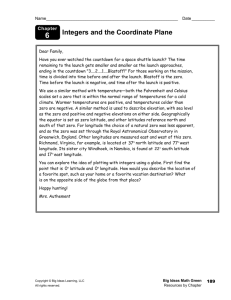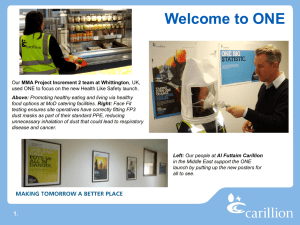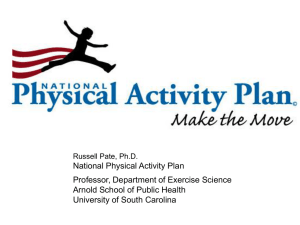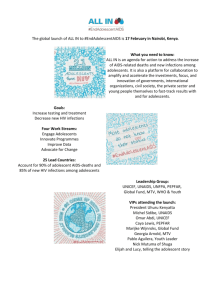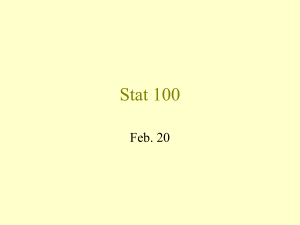Mental Health Network Launch Report
advertisement
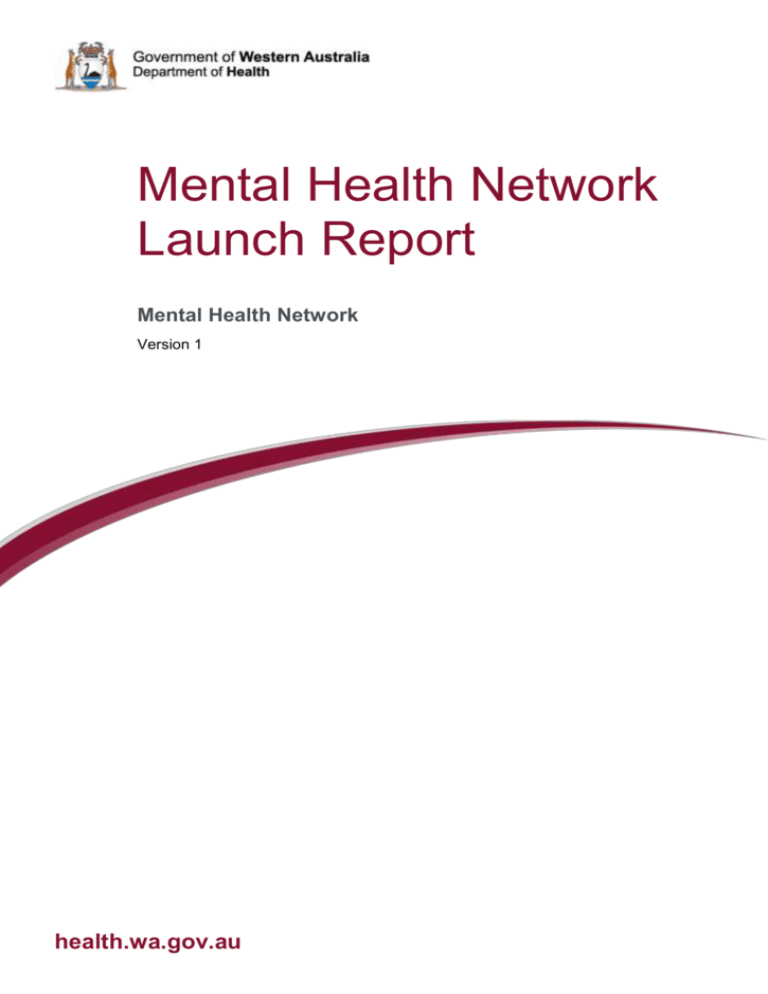
Mental Health Network Launch Report Mental Health Network Version 1 health.wa.gov.au Contents Executive summary 3 1. Introduction 4 2. Attendance 6 3. Workshop sessions 6 3.1 Issues across the life-course 7 3.2 Priority issues 8 3.2.1 Maternal 8 3.2.2 Child 8 3.2.3 Teenage/Youth 8 3.2.4 Adult 8 3.2.5 Aged 9 4. Rural and remote 10 4.1 4.2 Site specific priority issues 10 WA Country Health Service (Perth) 12 Wheatbelt (Northam) 13 Goldfields (Kalgoorlie) 13 Kimberley (Broome) 13 WA Country Health Service (Perth) 14 Rural and remote themes 15 5. Themes for the Mental Health Network 16 5.1 Mental Health Network Strengths 16 5.2 Mental Health Network Opportunities 16 5.3 Mental Health Network Aspirations 17 5.4 Mental Health Network Results 17 6. Introduction of the Co-Leads 18 7. Evaluation feedback 20 8. Discussion 22 9. Appendices 23 Appendix A: Mental Health Network Project Steering Committee 23 Appendix B: Mental Health Network event program 24 Appendix C: Rural and remote event program 25 Appendix D: Workshop methodology 26 Appendix E: Evaluation survey questions 27 2 Executive summary The Mental Health Network was launched during Mental Health Week in October 2014. It was well represented by close to 300 people attending in person or video conference. Representative delegates included those with lived experience, government, non-government, not for profit, private organisations, area health services, health practitioners and university based academics. The aim of this Report is to document the day’s proceedings. The event was launched by the Hon. Helen Morton, Minister for Mental Health, Disability and Child Protection with supporting presentations by the sponsors, Professor Bryant Stokes A/Director General of the Western Australia, Department of Health and Mr Timothy Marney, Mental Health Commissioner, Mental Health Commission. Ms Fiona Payne, in her capacity as an inaugural Co-Lead of the Disability Health Network provided her recollections of the first year of establishing a network. This was followed by powerful presentations and messages from Ms Lyn Mahboub and Ms Kylie Fryer on their lived experience. The presentations were followed by a series of workshops. This created an excellent opportunity for the newly recruited Co-Leads to listen to the broad and diverse range of issues put forward by participants and their future aspirations for mental health and wellbeing for Western Australians. The Co-Leads were formally introduced to participants at the end of the launch in order to allow them to focus on listening throughout the day. The Co-Leads acknowledged the tremendous support from the mental health community for this initiative and both leads recognised the launch as a positive first conversation with the Network. The Co-Leads and an Executive Advisory Group will now complete the analysis of all the information captured during the day and continue to liaise with members, sponsors and other key stakeholders in order to develop the priorities of the Network. The Co-Leads look forward to working with you in order to achieve positive mental health and wellbeing outcomes for the people of Western Australia. The inaugural Mental Health Network Co-Leads, Dr Helen McGowan (left) and Ms Alison Xamon. 3 1. Introduction The Hon. Helen Morton, Minister for Mental Health; Disability and Child Protection officially launched the Mental Health Network during Mental Health Week, Monday 6 October 2014. The event was held at the Pan Pacific Hotel, Perth. The establishment of the Mental Health Network was instigated by Professor Bryant Stokes A/Director General, WA Department of Health in partnership with Mr Timothy Marney, Mental Health Commissioner, Mental Health Commission. Planning for the event including the recruitment of Co-Leads was assisted by a project steering committee (Appendix A). The launch was attended in person by 280 people from across the mental health sector. Attendees included people with a lived experience, representatives from area health services, government, non-government, not for profit and private organisations, health practitioners and university based academics. The morning’s proceedings were webcast to rural and remote participants, who also had the opportunity to participate in a rural and remote specific workshop via video conference. Health professionals from the Wheatbelt, Goldfields, Kimberley and Pilbara participated via this method. The morning included presentations from the following: Dr Richard Walley – Welcome to Country. Mr Walley provided a warm welcome on behalf of the Noongar Wadjuk people. He acknowledged the significant burden of mental health issues on Aboriginal people and the importance of this meeting. Hon. Helen Morton, Minister for Mental Health; Disability and Child Protection – Opening address. In the context of the current reform agenda including the Mental Health Bill 2013; a soon to be released ten year mental health, drug and alcohol plan, The Minister stated that the Network was ‘a wonderful opportunity to improve Western Australia’s mental health system in a connected and collaborative way’. She recognised the formation of the Network as a positive step toward ‘a modern, comprehensive system that meets the needs of our population into the future’. The Minister looked forward to the momentum the Network would bring to the reform agenda. Professor Bryant Stokes, A/Director General– WA Department of Health perspective. Professor Stokes highlighted the attributes of a network approach as it ‘allows people to come together from across the organisations in the community; to break down organisational barriers; to form partnerships; to learn and share evidence-based policy and best practice; and better engage with consumers and stakeholders’. Professor Stokes stated that he is a strong advocate of a network approach having first-hand experience in participating in networks in order to develop a broad range of strategic policies. He acknowledged his personal interest in mental health, particularly in light of the stark statistics and his involvement in producing the Stokes Review 2012. He reminded us of the past culture of suffering in silence and the recent positive steps toward greater community acceptance and the great efforts toward reducing stigma. Professor Stokes extended his gratitude to the Mental Health Commissioner for agreeing to form this partnership to support the Mental Health Network. 4 Mr Timothy Marney, WA Mental Health Commissioner – Mental Health Commission perspective. Mr Marney provided his insight into how the Network might contribute to improving WA’s mental health system. He stated that a key component of reform needed in mental health was culture change. The change required needs to focus on ensuring the system is respectful, person-centred and recovery-orientated. The Network provides an opportunity for individuals to have a genuine voice in system improvement and to promote recovery orientated practice in the mental health sector. Ms Fiona Payne, Co-Lead Disability Health Network – What are Networks: a network CoLead perspective. Fiona described the benefits of utilising networks to help bring consumers, carers, health professionals and policy makers together to help implement change. She described the attributes needed for an effective network as being ‘collective wisdom, shared vision, key influencers, agreed priorities, managing obstructions, having a multi-level approach and whole of community focus’. She highlighted the importance in the first year of taking the time to get the governance and communication right before leading into priorities and projects. Importantly, she also stated that ‘the priorities must come from the Network’. Her closing words of encouragement were ‘people will contribute because it matters’. Ms Lyn Mahboub – Individual lived experience perspective. Lyn’s powerful opening statement which acknowledged ‘those who have gone before us, on whose shoulders we stand, it is because of their work that I feel I can safely come out about my own madness and join the mission they started toward reform’. She reminded us of the Network Branch’s mantra ‘connect, share, improve’ and the importance of ensuring that all are able to participate including those with lived experience. She challenged participants to think ‘bigger and bolder’ about the inclusion of people with lived experience in the workforce and how we can all grow our capacity to come together and work together for the common goal. Ms Kylie Fryer – Family lived experience perspective. Kylie described her experience of caring for family members who have a variety of mental health diagnosis. Over the past forty years she describes witnessing ‘the best and worst of the mental health system’. This has been a driving force for Kylie which has culminated in her becoming a carer representative. She describes her passion for participating in the reform agenda which will in turn help to improve the lives of her loved ones. Whilst frustrated by the slowness of the system to respond, Kylie describes the establishment of the Mental Health Network as ‘a clear step in the right direction’. She describes ‘her hope that her family members will experience recovery and live fulfilling lives with or without the presence of mental illnesses’. 5 On completion of the opening address and presentations, participants took part in three workshops as follows: Workshop one – Let us hear your issues across the life-course. Workshop two – Identifying the priority issues. Workshop three – Setting the Network direction against your priorities. Whilst the principle aim of the day was to launch the Network, the project steering committee agreed that this valuable opportunity could also be used to: Bring everyone together who has an interest in mental health and to start the process of listening and sharing ideas on how the Mental Health Network can help improve the mental health and wellbeing of the community across the continuum. Provide the basis of information gathering in order to develop priority areas that the Mental Health Network can best support. The Co-Leads were recruited via a highly competitive process which was finalised three weeks prior to the event. The workshops were designed by the project steering committee to capture valuable information to assist the Co-Leads to identify the common issues from across the sector and identify some of the priority issues for the Network. 2. Attendance 320 people registered to attend the launch day in person. 280 people attended the launch in person (87%). 17 people attended the rural and remote specific video conference. 209 people were added to the Mental Health Network as a result of registering for the launch event. 1331 people are now subscribed to the Mental Health Network. 3. Workshop sessions Prior to the day registrants selected their area of interest from across the life-course consisting of the following domains: Maternal (three tables) Child (one table) Teenage/youth (six tables) Adulthood (twelve tables) Aged (three tables) Approximately 250 people participated in the workshop sessions. All of the information has now been transcribed verbatim into electronic format and has been placed in a separate Mental Health Network Launch-Supplementary Report. This will be made available on the Mental Health Network website home-page for review http://www.healthnetworks.health.wa.gov.au/network/mental.cfm Each table was allocated a facilitator. A scribe was sought on each table to record feedback on pre-prepared flip charts. Further information regarding workshop methodology can be found at Appendix D. 6 If participants identified important issues during the day that were not able to be discussed sufficiently or were considered beyond the scope of the workshop then these issues were written down and placed in the ‘burning issues’ box (see Supplementary Report for a full transcript of the issues ). 3.1 Issues across the life-course In Workshop One, attendees were asked to brainstorm the issues across the life-course. 75 minutes were allocated to the first workshop to allow time for table introductions and identify a scribe. In order to capture a broad spectrum of issues, attendees were prompted to consider the following domains: Promotion Prevention Treatment Rehabilitation Recovery Tables also considered: Aboriginal Culturally and Linguistically Diverse (CaLD) Disability Drug and alcohol Rural and remote Other issues. Workshop one generated a considerable amount of information which was captured on over 150 pages of flip chart. This will be analysed by the Co-Leads and the Executive Advisory Group in detail. Themes emerging across the life-course were: Stigma Difficulties with navigating the system Promotion/prevention/early intervention Inequity/accessibility to services and information Education and training Language/health literacy Community support/services, networks or linkages Person centred care/holistic/one size doesn’t fit all Care close to home Culturally relevant and appropriate Sustainable resourcing Family involvement Recovery focus/trauma-informed care Social determinants – accommodation, employment Culture 7 3.2 Priority issues In Workshop two, participants were asked to consider all of the issues generated from Workshop one and reach consensus on a single priority issue for their table. Participants had 45 minutes to reach consensus. Each identified priority issue is listed below: 3.2.1 Maternal The need for increased community awareness and education. Lack of acceptable and accessible social and cultural support networks in the community for mothers, infants and their families. Perinatal and infant (versus maternal) mental health – need for substantive equality in the resourcing of perinatal and infant mental health in its personal/social and cultural context including supporting the healthy development of families. 3.2.2 Child Requirement for a Statewide Child and Adolescent Mental Health Plan or Strategic Framework specifically for children and adolescents that articulates the different and specific needs, issues, and approaches to achieve optimal mental health outcomes for children. 3.2.3 Teenage/Youth Community collaborative approach, such as through: o Supporting communities to support and include youth. o Mentors, leadership, peer support that can address issues that are specific forlesbian, gay, bisexual, transsexual and intersex (LGBTI) and Aboriginal etc. o Improving relationships between young persons and clinicians. o Youth co-design of services. Increased youth education required, for example life and coping skills (resilience building), increasing capacity to critically analyse messages portrayed in the media and social media. Person-centred, holistic, individualised care (scaffolded). Creating youth friendly contexts that are responsive and flexible to the individual and collective needs across the continuum of care. For example social model of care versus medical model. Determining and implementing up to date ways to better engage young people, for example innovative technology and common language across services, including culture. Reduce youth suicide. 3.2.4 Adult Stigma. Shared understanding of conceptual language across sectors. To enable recovery – safe, secure and stable housing with proper planning is essential. Developing a peer (consumer and family) workforce skilled in recovery orientated trauma-informed, family-centred practices based on national mental health competency standards. Holistic, whole of family, whole of life approach. Collegial collaboration that will decrease silos of care and improve professional information sharing and provide better service mapping. It is time to concentrate on action as a priority. 8 Coordinated, person-centred, holistic approach requiring consideration of co-occurring issues. Client chosen recovery goal drives the aim and design of treatment. Addressing social exclusion in mental health through creating more positive conversations about mental health rather than illness. For example, through education, awareness, understanding and collaboration and a commitment to address stigma. Whole of population focus. Service/care coordination –navigating the systems to access services covering the holistic spectrum of an individual’s needs. Need to have a major change in culture, values and attitudes with a focus on companion, holistic recovery, shared decision-making and rehabilitation with a focus on ‘healthy selves’. 3.2.5 Aged Person-centred, individual, community focussed care, but the system/process doesn’t allow it. Move away from a medical model towards a trauma-informed, social recovery model of care. The Mental Health Network creates synergies with other networks to promote the mental health of older adults for an appropriate range of services and reduces stigma. 9 4. Rural and remote In order to provide as much opportunity to capture the specific issues for rural and remote populations, a separate dedicated video conference session was held. A total of seven sites across WA registered for the video conference. Four sites contributed on the day: Wheatbelt (Northam) Goldfields (Kalgoorlie) Kimberley (Broome) Pilbara (Karratha) The workshops were coordinated from the Graylands Hospital site and co-facilitated by WA Country Health Service (WACHS), Head Office personnel and a Health Strategy and Networks staff member. Due to unforeseen circumstances the start of the video conference session was delayed. This culminated in having to modify the program to two workshops: Workshop one: Brainstorming the general regional issues drug and alcohol s issues In determining the issues, participants were asked to consider the life-course and: Promotion Prevention Treatment Rehabilitation Recovery Aboriginal CaLD Disability Drug and alcohol and others. Workshop two: 4.1 identifying the priority issues for their region Site specific priority issues In Workshop two, participants were asked to state the priority issues for their region. The priority issues for each region are as follows: Wheatbelt (Northam): Recruit and retention Access to clinical psychologist/psychiatrist poor particularly for adolescence specialities Good NGO access and potential to strengthen with good access to clinical psychiatry (via Prue) 10 State-wide forums good but not implemented well There is a local AMS so access to Aboriginal specialists is good Not able to fill to establishment A change in policy and procedures mean time is invested in change and implementation. A big task for small services to implement everything, EG. Mental Health Act requires giving people accurate information. To engage in policy and procedure implementation of any type. We need WACHS HO to lead a process to roll out to all services. Small services, could engage in a Working Group but a better process is for WACHS to write a draft for consultation. Goldfields (Kalgoorlie): Attraction and retention of staff to enable provision of services Disparity across the region about what other support services exist. EG: BOICO in Esperance but not Kalgoorlie (BOICO - About) Staffing and staff qualifications also an issue for non-government organisations. A specific program may succeed in the Eastern states but in Kalgoorlie. EG: Headspace (Headspace) a good step forward but very dependent on capacity of the consortium members. Kimberley (Broome): Agreed with Central Office overview WACHS very lean and resourceful at getting services on the ground, sometimes to their detriment. What can we consistently offer in terms of training and development? We need a standardise approach. What standard do we want and what do we need to deliver that Standard eg. These are the type of CAMS, Drug and Alcohol Adolescent services we want, to this standard so we require these resources to achieve that. Need established clinical governance and resources to support this governance. State based services need to pool dollars together to deliver state-wide services into the regions. We are reliant on locum services that are poor investments as locums are transient so do not establish a service, but if delivered to regions by a state body a better service could be provided. ABF – model for acute services in remote area causes great head-aches for hospital based services. Interphase with Commonwealth funded programs: How do state & federal services work better together to deliver state based services into the regions. Too much time spent recruiting and retraining – can’t get off the treadmill There is no doctor in the region. The State needs to decide on a best practice model. Suicide, Suicide prevention an issue in this region. 11 NGO’s working in Mental Health need to proliferate but need assistance to develop. So we need to house NGO & state services together. Area Head Office needs to assist regions as an umbrella governance organisation. Pilbara (Karratha): There is a lack of non-government organisations and it is hard for those who are available due to lack of accommodation, poor staff retention. There is a lack of recovery enabling activities for clients. Adoption of hobbies is a significant feature of recovery. There is a lack of consumer and carer positions and support for these. Lack of administrative staff so clinicians end up doing this type of work Lack of ability to gain learning experience. Looking forward to joining networking activities Join in research activities and included in outcomes as well as research trials. permission to travel not given because of lack of funding WAMS – looking to extended training into rural area. Mental Health and Drug and Alcohol sectors to connect. WA Country Health Service (Perth) Lack of standardisation of process and communication across region, eg: establishment of effective standard Mental Health data collection and communication tools is required. Agree with staffing issues raised by the regions Need to look at different ways to provide services eg: Tele Mental Health. Need to establish a process to identify gap and develop solutions We need to partner with NGO’s and other agencies. For Mental Health budget deficits and surpluses: We need to develop an agreed process for use of surpluses in one area on deficits in others. Roll out of Mental Health Act also an issue for us SSAMHS Program - how to guide it into base budget Stokes review initiatives roll out an issues for us Performance Monitoring Clinical indicators are required for measurement of service Engage CAMS Engagement of consumers and carers Rely heavily on NGO’s and Population Health to do MH prevention and promotion Central office needs a stronger role in these areas Link in better with metro services. Particularity those labelled state-wide – we need better links. Rural / Metro transfer between Mental Health beds Investing in Workforce Recruitment and retention, education and professional development. Future funding - SAMS – Aboriginal MOC implementation across regions metro / country pathways Tele – Mental Health- Need more support from Telehealth services based in Subiaco for technical support. 12 Public Mental Health Services have lost offices and CAMS services in Esperance. There are no houses to rent in Esperance. Wheatbelt (Northam) More support for Statewide Specialist Aboriginal Mental Health Services (SSAMHS) programs into core business. What does that look like? How do SSAMHS staff work with clinical staff? Staffing and recruitment – lack of NGO services means we are constantly asked to do everything for everyone. How much could be standardised and rolled out by region not site? Video conference is not a solution as most outer Wheatbelt sites cannot access the bandwidth required. If offered generally by WACHS with Northam as a central hub, this would increase access for other towns like Bencubbin. Goldfields (Kalgoorlie) Recruitment and retention of staff. Changing expectation and demand on services. Need for agreement on the type of service the region should offer and be realistic about what can be provided by the particular region. Explore opportunities to link with other regions or non-government organisations (NGOs) to meet expectations. WACHS sites need to be resourced to support NGOs more to create linkages and partnerships. Professional development and training – difficult to access in practice, for example permission to travel is restricted, the electronic classroom is not as effective as it might be. Invest more centrally in the dissemination of information around new policy and procedures. Kimberley (Broome) Remodel remote Mental Health Services to overcome current flaws, for example Mental Health and Primary care interface for service delivery. What staff do we have / what staff do we need in the regions, for example multi-skilled and flexible. Having staff with dual qualifications’ in place is essential for all regions. Regional staff should have primary care, mental health and drug and alcohol qualifications with services all on the same page, inclusive of aged care and Aboriginal Medical Services (AMS). Locums funded by Medical Specialist Outreach Assistance Programs (MSOAP) (Federally funded) –are not consistent, so clients have many new service providers and constantly need to re-tell their story, build rapport etc. Pilbara (Karratha) Growing number of problems to address but fewer staff to address them. 13 Lack of NGOs so the general public expect the state health system to provide everything, for example Mission Australia: Drug and Alcohol can afford staff but not housing. Also, Mental Health Week puts pressure on state staff. Many clients are homeless so treatment and recovery is hampered. Some professional development sessions/requirements are difficult to design as staff need to be all things to all people – but there is no staff. For example, the ‘staff recruitment freeze’ left us with no services in Roebourne. It is hard to look beyond core business. WA Country Health Service (Perth) Staffing and housing – 26th parallel subsidies should also apply for Kalgoorlie, Collie and Katanning. Need collaboration between the Department of Health and Homeswest. Esperance did have four mental health houses but now has none. 14 4.2 Rural and remote themes The lead facilitator shared the list of themes that had emerged having listened to the workshops. The following themes were recounted to participants for verification and agreement: Recruitment and retention of staff via: o Addressing mental health across the life-course and, drug and alcohol skill set deficits by re-modelling to create a multi-skilled and flexible workforce. o Housing that meets the needs of a transient workforce. o Assist staff to cope with the changing expectations of their role particularly in regard to supporting NGOs and the need to be ‘all things to all people’ by centralising and standardising some processes. Education and training: outreach is a better model for roll out of reform initiatives such as the Mental Health Bill 2013, the new Western Australia Mental Health, and Alcohol and Other Drug Services Plan 2015–2025 and Stokes Review 2012 initiatives. Clarification and articulation of what statewide services are. For example, what does service ‘X’ look like, who is responsible for it, within it and where is it best located? What are state services as opposed to non-government services? Consumer and carer engagement. Benchmarking of services. Centralised methods to assist establishment of NGOs in the rural and remote areas. Consideration of the implications of Activity Based Funding (ABF) on acute hospital services. Better integration, navigation, monitoring of workforce, culture and service delivery across the state. Whilst every attempt was made to engage with people in rural and remote locations there were a number of deficiencies which led to a less than ideal experience for participants: Lack of suitable technology in the regions to enable participation in the webcast. The timing of the event was not optimal for maximum participation. Under representation of stakeholders from across the sector, for example those with lived experience and NGOs. The themes identified in the workshop will be considered by the Co-Leads and the Network team in conjunction with the themes captured from the metropolitan based workshop (section 5). 15 5. Themes for the Mental Health Network During the final metropolitan workshop participants were asked to identify how the Mental Health Network could act on the priority issues raised in the earlier session, using the Strengths, Opportunities, Aspirations and Results (SOAR) process to brainstorm ideas. Participants were allocated 45 minutes to complete this workshop. SOAR information from Workshop three was transcribed to electronic format and analysed to identify themes that the Mental Health Network could best support. The following themes were identified: 5.1 Mental Health Network Strengths The greatest strengths of the Mental Health Network include the ability to: 5.2 Involve everybody in the conversation about mental health including those with a lived experience, family lived experience, rural and remote, metropolitan residents, children, youth, adults and older adults, private, public and community managed service providers, health, non-health sectors and universities. Build on the enthusiasm, experiences and skills of people involved in the Network to improve the mental health system. Engage all stakeholders to foster a community collaborative and partnership approach. Utilise established networks to strengthen the partnership beyond the mental health sector. Promote a person-centred and recovery-oriented culture across the mental health system. Contribute to raising awareness in the wider community of the important mental health issues, including positive messages of mental health and wellbeing. Mental Health Network Opportunities The best opportunities identified for the Mental Health Network include the ability to: Use a variety of techniques and strategies to engage with the community. Raise awareness and knowledge of mental health and illness in the broader community to assist in reducing stigma. Disseminate information about available resources in the community to assist people to navigate the mental health system better. Develop and promote champions, including individuals and organisations, people with a lived experience, family lived experience and health practitioners to promote system improvement. Build on ideas and strategies from individuals and organisations within and outside of the Mental Health Network to support system improvement. Promote connectedness by actively building partnerships. 16 5.3 Mental Health Network Aspirations The future envisaged by the Mental Health Network includes: 5.4 Education and knowledge about mental health and wellbeing in the broader community is improved. Individuals, families and health practitioners feel engaged and included in the development of the mental health system. Mental health services are person-centred, responsive and recovery-oriented. The service system is better integrated and services are better connected, resulting in improved access and clearer pathways for individuals and their families. Best practice is adopted across the sector which promotes consistency and equity. Mental Health Network Results The measurable results that will inform the Mental Health Network has achieved the future vision include: Evidence of a common understanding of mental health and wellbeing across the community. Partnerships are established across the sector which are inclusive of those with a lived experience, family lived experience, rural and remote, metropolitan residents, children, youth, adults and older adults, private, public and community managed service providers, health and non-health sectors. Positive feedback from individuals, families and health practitioners on system improvements. Positive evaluation outcomes from initiatives delivered by the Network. 17 6. Introduction of the Co-Leads The Co-leads were introduced at the end of the day. They were invited to reflect on the day’s proceedings and their aspirations for the Network. Alison Xamon is the President of the WA Association for Mental Health and the Deputy Chair of Community Mental Health Australia. She is a Member of the WA Ministerial Council for Suicide Prevention and is a Board Member of Mental Health Australia. A practicing solicitor, Alison also works with refugees and newly arrived migrants from CALD backgrounds most of whom have backgrounds of torture and trauma. Alison was previously a State Member of Parliament representing the East Metropolitan region in the Legislative Council and held the portfolio of mental health, amongst other portfolios. Alison has a long history of working as both an advocate and change agent within a variety of sectors and settings and is keen to bring together champions within the sector, both those with lived experience and clinicians working within the mental health system. Alison has a particular interest in ensuring that services fully understand and embrace a recovery focus, understand trauma-informed care, practice co-production, and harness the knowledge of lived experience, whilst creating collaborative and respectful relationships with mental health professionals across Government and non-Government sectors. Alison reflected that after years of consultation and promise of reform, the reality was that for many there remains a cynicism as to whether the system can and will change. Alison believes that not only is change possible, she believes we are on the cusp of significant reforms and that there are even now examples of excellence occurring within the sector. So many of those working within the sector remain passionately committed to improving people’s lives and are keen to be part of improving the system. Alison also noted that it is important to remember that many of those working within mental health have lived experience themselves and that often the perceived divide between lived experience and clinicians is not as wide as some may think. Alison believes that the Network provides a unique opportunity to bring all elements of the mental health sector together. Helen McGowan is a Psychiatrist of Old Age and the Clinical Director of Mental Health Services for North Metropolitan Health Services. She has considerable experience in clinical care and service development and is also an active member of the Royal Australian and New Zealand College of Psychiatrists. She has a keen interest in interprofessional education, strategic planning and is a strong supporter of the clinical reform approaches that support clinicians to work collaboratively to streamline care and ensure consistency of best practice and equity of access to cost-effective care. Helen recognises the key insights that are detailed in the research literature that relates to recovery, trauma-informed care and person centred care. She is acutely aware of the need to work collaboratively and empathetically with consumers, carers and families to ensure they are empowered to strengthen their social networks and recover their capacity for a full life. Helen emphasised to the audience that she is delighted to be engaged with a network that is already energised and passionate about the need for improving the mental health of West Australians. She noted that despite the number of forums and organisations that are established, that many in the sector do not feel that their ideas are heard or understood and that dialogue is often conflictual and heated. In her view, there is much more that aligns than divides the mental health sector and the Network will need to focus on the development of efficient organisational structures and communication processes that build a shared and rich understanding of the key priorities. 18 Helen and Alison are already developing a warm, respectful and effective working relationship and are delighted to be working together. They are looking forward to working with members of the Network to improve the mental health of Western Australians. 19 7. Evaluation feedback Participants were requested to complete a simple online evaluation of the launch event (Appendix E). Health Strategy and Networks frequently hosts events therefore this was an important aspect of feedback. 86 people completed the online evaluation (30%). Below is a sample of the questions asked, with accompanying feedback. I was given the opportunity to contribute during the workshop sessions Quotes from evaluation: 97% Agree the launch provided opportunity to contribute during the workshop sessions. “The opportunity to contribute to the evolving direction of mental health in WA. It was a very effective forum for the sort of brainstorming that took place”. “Everyone's willingness to network and help”. “An opportunity to express my views”. “I was appreciative that the discussions were targeted to my area of interest, and I did not have to sit through long discussions about irrelevant topics”. “The opportunity to share my opinions and experience in a context that could influence future mental health outcomes for WA”. “The structure of the Mental Health Network launch allowed everyone to have their say and to identify the main priority issues”. I believe my contributions to the workshop sessions were valued Quotes from evaluation: “Being able to express my opinion from a consumer perspective and seen as a valued person”. 93% Believe their contributions to the workshop sessions were valued. “The opportunity to make a contribution to the future work of the Network”. “I valued the workshop sessions on Youth Mental health and the discussions that transpired from those. Being a 'young' person (under 30) I felt that my voice and opinions were heard and received quite well, and I was able to give not only my personal lived experience but also my professional knowledge and experience on the issue. I also very much enjoyed and valued the networking opportunities that the launch accommodated for”. 20 Attendance at the Launch was a valuable use of my time Quotes from evaluation: 85% Agree attendance at the launch was a valuable use of their time. “Excellent that this initiative has been created and I'm excited to see the results. I hope to be involved further”. “Well organised thanks”. “Thank you for a very worthwhile day”. “It was very good and I enjoyed it”. It was a worthwhile event”. The workshop sessions identified the key issues for Mental Health in WA Quotes from evaluation: 81% Agree the workshop sessions identified the key issues for Mental Health in WA. “The structure of the Mental Health Network launch allowed everyone to have their say and to identify the main priority issues”. “It gave me inspiration to voice more ideas to key individuals/ Co-Leads”. 21 8. Discussion The principle aim of the day was achieved and it was a great privilege to have the Minister for Mental Health, Disability and Child Protection launch the Network. The presence of both the A/Director General of the WA Department of Health and, the Mental Health Commissioner as the sponsors sent a strong message of support. It was tremendous to see the level of interest and energy from a wide spectrum of the community. Close to 300 people attended, including people with lived experience. It was also very encouraging to see that membership of the Network had already grown to 1331 people by the launch date. We hope that you will encourage those interested in mental health and wellbeing to join the Network. The opportunity to listen to the participants’ issues and to identify the current and future strengths, opportunities, aspirations and results of the Network in achieving positive outcomes has been a valuable first step for the Co-Leads. After consideration of the information gathered at the launch the Co-Leads will oversee: Completion of the analysis of the issues discussed at the workshops (see Supplementary Report) and follow up with network members to further develop a better understanding of their key areas of interest. Promotion of the Network to attract engagement with people who may not have been able to attend the launch. Further consultation with people living in rural and remote areas. Formation of a small Executive Advisory Group (EAG). Following on from this first conversation, the Co-Leads, supported by the EAG will develop a set of early priorities to focus on for 2015. They will focus on the establishment of the communication and networking processes in order to facilitate collaboration across the sector. The Co-Leads look forward to working with the broad and diverse Mental Health Network membership. 22 9. Appendices Appendix A: Mental Health Network Project Steering Committee Name Name Name Name Name Name Name Name Name Name Name Name Name Name Name Name Rod Astbury John Banfield Myra Browne Richard Clark Eric Dillon Gary Geelhoed Shauna Gaebler Maureen Lewis Patrick Marwick Richard Menasse Michael Mitchell Mark Slattery Cresswell Surrao Alexandra Welborn Adrienne Wills Position Posi tion Posi tion Posi tion Posi tion Posi tion Posi tion Posi tion Posi tion Posi tion Posi tion Posi tion Posi tion Posi tion Posi tion Posi tion Executive Director A/Executive Director Director Senior Development Officer A/Director Chief Medical Officer Executive Director A/Director Executive Director Director Program Manager A/Director Clinical Consultant Consultant Psychiatrist Director Organisation Organis ati on Organis ati on Organis ati on Organis ati on Organis ati on Organis ati on Organis ati on Organis ati on Organis ati on Organis ati on Organis ati on Organis ati on Organis ati on Organis ati on Organis ati on WA Association for Mental Health Office of Mental Health Drug and Alcohol Office Health Strategy and Networks Mental Health Commission Office of the Chief Medical Officer Consumers of Mental Health WA Mental Health Commission North Metropolitan Health Service Western Australia Country Health Service Aboriginal Mental Health Health Strategy and Networks Office of the Chief Psychiatrist Mental Health Commission Child and Adolescent Health Service The Committee disbanded on completion of the launch, Monday 6 October 2014. 23 Appendix B: Mental Health Network event program 24 Appendix C: Rural and remote event program 25 Appendix D: Workshop methodology The workshops were designed by Project Steering Committee in order to: bring together everyone who has an interest in mental health and to start the process of listening and sharing ideas on how the Mental Health Network can help improve the mental health and wellbeing of the community across the continuum. provide the basis of information gathering in order to develop priority areas that the Mental Health Network can best support. In order to break the information into manageable chunks for further analysis the life-course approach was identified as a suitable method to achieve this. This approach has been advocated by the World Health Organisation (2000) as it draws upon the theoretical temporal dimension of health and ageing, rather than distinct episodes of illness; personalises and humanises ill health as part of a life process1. The domains of promotion, prevention, treatment, rehabilitation and recovery were chosen to help facilitate and prompt participants to capture a broadness of the issues. This is based on a modification of Mrazek & Haggerty’s Spectrum of interventions 1994 (cited in the Department of Health and Human Services2). It has been widely used and has been recognised as a useful population based health framework. It was modified to include recovery, in recognition of the greater understanding and relevance this has in the optimal management and maintenance of mental health and wellbeing. Participants were prompted to also consider: Aboriginal Culturally and Linguistically Diverse (CaLD) Disability Drug and alcohol Rural and remote This is in recognition of the social inclusion issues associated with minority groups and the impact that this places on mental health. It also reminded participants of the significant burden that drug and alcohol abuse has on mental health and wellbeing. 1 World Health Organization, The implications for training of embracing: A Life Course Approach to Health, accessed 21 November 2014, http://www.who.int/ageing/publications/lifecourse/alc_lifecourse_training_en.pdf 2 Department of Health and Human Services, Building the Foundations for Mental Health and Wellbeing: Review of Australian and International Mental Health Promotion, Prevention and Early Intervention Policy, accessed 21 November 2014, http://www.dhhs.tas.gov.au/mentalhealth/publications/strategic_documents/PPEI_Review.pdf 26 Appendix E: Evaluation survey questions 1. Which description below best describes your attendance at the Mental Health Network Launch? 2. Which of the sessions listed below did you attend at the Mental Health Network Launch? Tick as many as apply 3. Which of the sessions listed below did you attend via videoconference at the Mental Health Network Launch? Tick as many as apply 4. Please rate the Morning Session live webcast on the following aspects: 5. Below are some statements about the Mental Health Network Launch. Please rate your level of agreement/disagreement with each statement. 6. What if anything, did you value most about the Mental Health Network Launch? 7. What, if anything, could have been done better at the Mental Health Network Launch? 8. Please provide below any general feedback about the Mental Health Network Launch, or suggestions for future events. 27 This document can be made available in alternative formats on request for a person with a disability. © Department of Health 2014 Copyright to this material is vested in the State of Western Australia unless otherwise indicated. Apart from any fair dealing for the purposes of private study, research, criticism or review, as permitted under the provisions of the Copyright Act 1968, no part may be reproduced or re-used for any purposes whatsoever without written permission of the State of Western Australia.

